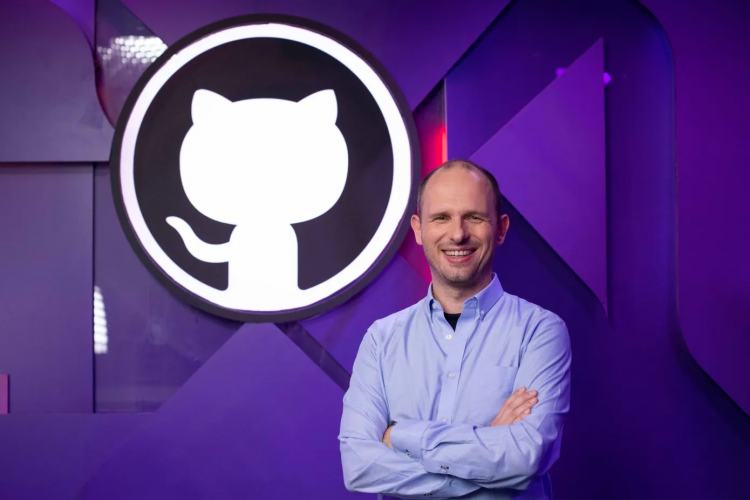This week, the tech world witnessed a significant leadership change as GitHub CEO steps down, marking the end of an era for one of the most influential developer platforms. Thomas Dohmke, who has led GitHub since late 2021, announced that he will step down from his role to return to his entrepreneurial roots and start a new venture. His departure will coincide with a major structural shift: GitHub will be integrated directly into Microsoft’s CoreAI division.
The move comes at a time when the race to dominate AI-powered developer tools is accelerating. GitHub has been at the center of this transformation, particularly through the rapid evolution of GitHub Copilot, which has grown from a smart coding assistant to a fully conversational AI tool.
Background of the CEO Transition
When GitHub CEO steps down, it marks the conclusion of nearly four years of leadership defined by AI innovation and global expansion. Under Dohmke’s tenure, GitHub Copilot saw massive adoption, GitHub Actions grew into a core part of developer workflows, and the platform expanded into new regulated markets such as government cloud services.
Dohmke succeeded Nat Friedman as CEO and carried forward the vision of making GitHub the central hub for modern software development. His leadership emphasized AI as a transformative force, working closely with partners like OpenAI and Anthropic to embed advanced models into the platform’s tools.
In his farewell announcement to employees, Dohmke described his decision as a personal one, driven by a desire to return to startup building. He highlighted the pride he felt in leading a team that had navigated significant milestones, from major AI product launches to increased platform security certifications. He also committed to staying through the end of 2025 to ensure a smooth leadership transition.
Strategic Integration into Microsoft CoreAI
One of the biggest changes accompanying Dohmke’s departure is GitHub’s deeper integration into Microsoft’s CoreAI division. Microsoft will not appoint a new GitHub CEO; instead, the platform will be led directly under CoreAI’s leadership. This reflects a broader strategic push to unify AI research, product development, and deployment under one umbrella.
CoreAI, led by Jay Parikh, plays a central role in Microsoft’s AI roadmap. By embedding GitHub into this division, Microsoft is aiming to speed up innovation cycles for AI-powered developer tools. This integration will likely result in closer alignment between GitHub Copilot’s evolution and Microsoft’s other AI initiatives, such as Azure AI and enterprise automation products.
This shift also marks the end of GitHub’s semi-independent operating model within Microsoft. Since its acquisition in 2018, GitHub had retained a degree of operational autonomy, allowing it to maintain a distinct culture and developer-first ethos. Now, its strategy will be even more closely tied to Microsoft’s AI priorities.
Implications for Developers and the AI Ecosystem
The fact that GitHub CEO steps down during a period of intense AI competition is telling. Rival platforms, including Google’s AI coding tools and newer startups like Cursor, are quickly gaining traction. The integration into CoreAI could give GitHub a stronger competitive position by giving it direct access to Microsoft’s AI research resources and infrastructure.
For developers, this change could mean more rapid feature updates, better integration with Microsoft services, and more sophisticated AI assistance in everyday coding tasks. GitHub Copilot is already used by millions of developers worldwide, offering AI-powered code suggestions, debugging help, and even natural language explanations of code.
However, some in the developer community may wonder whether this deeper corporate integration will affect GitHub’s openness and neutrality. GitHub’s strength has always been its role as a home for projects across all ecosystems, regardless of corporate affiliation. Striking a balance between AI-driven innovation and preserving its inclusive developer community will be critical.
Meanwhile, Dohmke’s next move will be closely watched. With his track record of leading AI-driven transformation at GitHub, his new startup could well become a notable player in the developer tools or AI space.
Looking Ahead
The moment when GitHub CEO steps down is more than a leadership change. It is part of a broader realignment of the platform’s place within Microsoft’s AI ambitions. The integration into CoreAI suggests that GitHub will continue to evolve at the forefront of AI-enhanced software development.
In the coming years, developers can expect deeper AI capabilities woven into every stage of the coding process, from idea generation to deployment. Whether these changes will accelerate GitHub’s growth or challenge its community-driven identity remains to be seen. What is certain is that GitHub’s influence on the global software development landscape will remain strong, shaped now more directly by Microsoft’s vision for an AI-powered future.
Read More






 Friday, 27-02-26
Friday, 27-02-26







